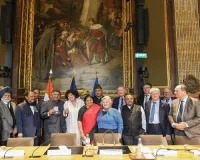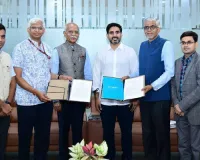AP to build three circular economy parks : CM Naidu
circular economy parks
By The Capital
On

Chief Minister N. Chandrababu Naidu has directed officials to finalise a comprehensive circular economy policy within the next two months. In a review meeting held at
• Expected to create 1 lakh jobs
• Focus on 11 sectors and 3 key departments
• Plastic ban in 21 cities by October
Chief Minister N. Chandrababu Naidu has directed officials to finalise a comprehensive circular economy policy within the next two months. In a review meeting held at the Secretariat on Tuesday, the Chief Minister emphasised the urgent need to shift from a linear waste model to a sustainable, resource-efficient system. He announced that the government would establish three circular economy parks across different regions of the State within a year and ordered the immediate clearance of legacy waste.
Three parks in one year :
As part of the plan, the first park will be set up on 400 acres in Visakhapatnam, developed to meet international standards. The Chief Minister asked officials to study similar models from other countries and explore ways to attract global investment. He also stressed the need to modernise waste-to-energy plants by deploying advanced machinery, and called for a detailed action plan on waste segregation and recycling to be submitted within 90 days.
The circular economy strategy will focus on 11 key sectors identified by the Central government: municipal waste, agriculture, industry, vehicles, lithium batteries, tyres, rubber, electronics, aqua waste, gypsum, and plastics. Additionally, Chandrababu directed that the departments of mining, handlooms, and animal husbandry also be included under the new framework. Urban and rural local bodies have been asked to work toward achieving zero waste goals.
Swachhta awards to encourage best practices :
To incentivize good practices, the Chief Minister announced that ‘Swachhta Awards’ would be introduced from October 2, 2025, to honour individuals and institutions demonstrating excellence in waste management. Categories will include local bodies, self-help groups, anganwadis, schools, colleges, hospitals, NGOs, and others contributing to clean and sustainable communities.
Chandrababu also ordered a complete ban on single-use plastics in Visakhapatnam, Vijayawada, Tirupati, Rajahmundry, and 17 other municipal corporations starting October 2, 2025. He encouraged the increased use of cloth bags and announced the establishment of 157 Reduce-Reuse-Recycle (RRR) centres across 87 urban locations to support the initiative.
52 waste clusters :
Officials informed the CM that the State has already set up 52 waste clusters, two in each district, covering both urban and panchayat areas. They shared data highlighting the magnitude of the State’s waste problem: Andhra Pradesh generates 36,588 tonnes of battery and automotive waste, 61,996 tonnes of plastic waste, 23,928 litres of oil waste, and 59,654 metric tonnes of tyre and rubber waste annually. The agricultural sector adds over 4 million metric tonnes, while the livestock, poultry, and aquaculture industries contribute 34.7 million metric tonnes. Rural households produce 1,329 metric tonnes of waste per day from 8.8 million homes.
The Chief Minister also reviewed incentive models adopted by Rajasthan, Karnataka, and Maharashtra, with a view to integrating the best practices into Andhra Pradesh’s approach.
Officials estimate that a well-implemented circular economy could increase the State’s Gross State Domestic Product (GSDP) by Rs 15,000 crore annually, provide Rs 10,000 crore worth of secondary materials to the manufacturing sector, and generate Rs 3,000 crore in GST revenue. The initiative is also expected to create 1 lakh direct jobs, support 10,000 micro-entrepreneurs, and impact the livelihoods of over 1 million people.
In addition to its economic benefits, the circular economy model promises significant environmental advantages, including the reduction of carbon emissions and better control of air, water, and land pollution. The Chief Minister reiterated that the goal is not just waste management, but turning waste into a source of economic value and employment.
Tags
Latest Posts
17 Jun 2025
A shocking incident of vigilante violence has come to light in Narayanapuram, under Kuppam Municipality, where a woman was tied...









